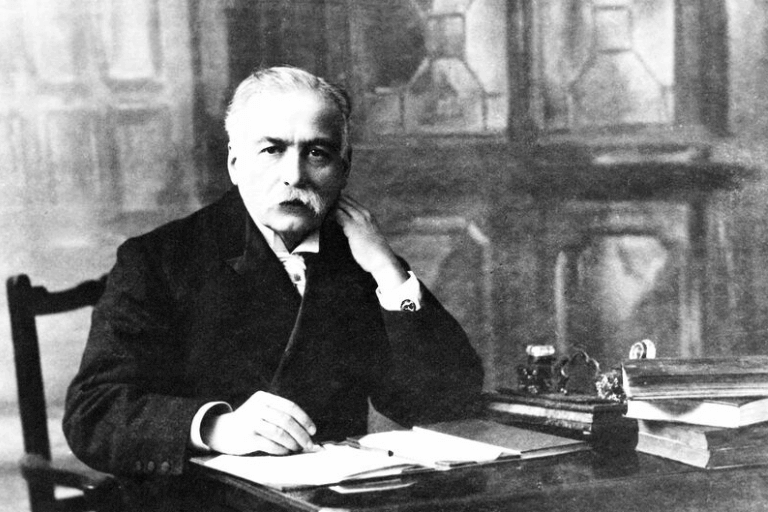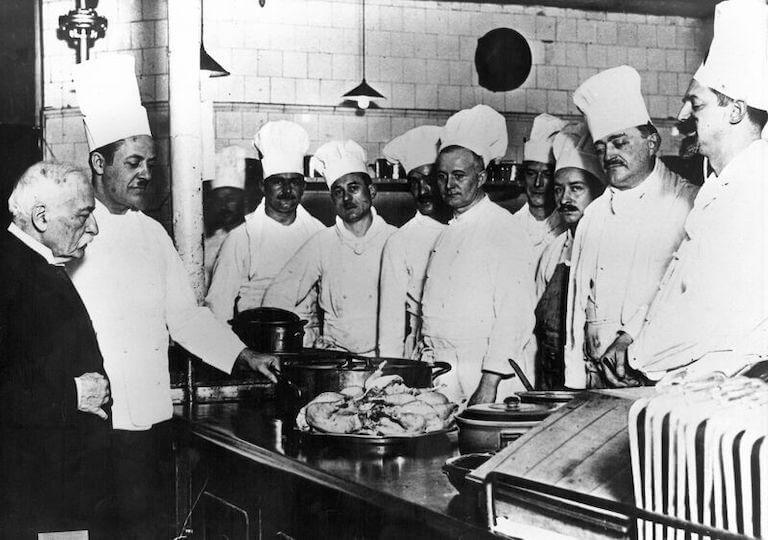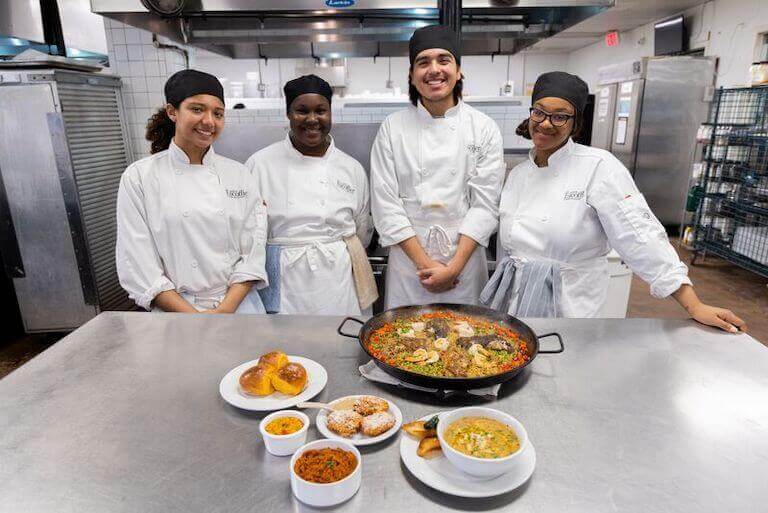Listen to This Article:
Have you ever wondered how professional kitchens became so organized and efficient? The answer lies with culinary legend Auguste Escoffier. Known as the “King of Chefs and Chef of Kings,” his influence extends far beyond fancy titles. Escoffier revolutionized how kitchens operate, streamlined menus, and championed the training of future generations of chefs.
Today, his legacy lives on at Auguste Escoffier School of Culinary Arts, where his methods and techniques continue to be passed on to aspiring chefs.
Michel Escoffier, the great-grandson of the famed culinary icon, is the president of the Auguste Escoffier Foundation and Museum in Villeneuve-Loubet, France. In this article, he shares his great-grandfather’s passion to train professional chefs and how the culinary school that bears his name enables his legacy to live on.

Auguste Escoffier transformed commercial kitchens and the restaurant industry.
How Auguste Escoffier Became the Gold Standard of Excellence in the Culinary World
From a young age, Auguste Escoffier had an innate, persistent drive to be the best, which he applied to his career even though he didn’t originally intend to become a chef. His culinary career began when his father made him work as an apprentice in his uncle’s restaurant in Nice. While the conditions in the kitchen were poor, he resolved to rise above the ordinary and, over the years, worked his way into the kitchens of some of the top restaurants in France.
Auguste Escoffier developed countless innovative recipes and techniques throughout his career. A few timeless classics created by Escoffier include Sauce Béarnaise, Peach Melba, Veal Prince Orloff, and Lobster Thermidor.
But Escoffier’s most extraordinary accomplishments weren’t just from what he made in the kitchen but also from how he operated in the kitchen. While serving as a French army chef for seven years, Escoffier learned how the military’s hierarchy benefited the efficiency and organization of the kitchen. With everyone having a specific job to do and knowing who to report to, things ran smoothly. He brought this experience with him when he returned to the world of commercial kitchens. Ultimately, he developed entirely new systems for kitchen organization and menu development, which are industry standards to this day.
A Brief History of Auguste Escoffier’s Culinary Advancements
- In 1864, Escoffier became Commis Rotisseur at the esteemed Le Petit Moulin Rouge in Paris, where he cooked for the world’s celebrities and royalty, eventually earning him the title, “Chef of Kings.”
- Escoffier moved to London in 1890, beginning his famous tour at the Savoy Hotel. It was here he created some of his most famous dishes including Filets de Sole Coquelin and La Peche Melba.
- After the Carlton Hotel opened in 1899, Escoffier was able to put his revolutionary ideas into practice, introducing a la carte dining, a new approach to menu development. He also enforced his brigade system managerial hierarchy of kitchen staff, which remains the industry standard today.
- Escoffier published Le Guide Culinaire textbook in 1903, outlining classic French cuisine, making it accessible to countless aspiring chefs all over the globe.
- After nearly 50 years working in restaurants, Escoffier retired in 1920 but continued to publish books and serve as an industry influencer until his death in 1936.
Training the Next Generation of Chefs
While Escoffier mentored many throughout his career and life, he was also passionate about training the next generation of chefs. He published the book Le Guide Culinaire in 1903 as a resource for future chefs. The book immediately became a must-have for French cuisine and has since become a classic reference for even modern-day chefs more than a century later. The book includes over 5,000 recipes from French cuisine, many of which were created by Escoffier himself.
Upon his retirement in 1920, Escoffier remained involved in the restaurant industry and actively mentored others for the remainder of his life.

Escoffier trained and mentored thousands of chefs throughout his career.
Community, Teamwork, and Camaraderie at Auguste Escoffier School of Culinary Arts
Jack Larson opened Auguste Escoffier School of Culinary Arts, which transformed the typical culinary school approach. Inspired by August Escoffier, Larson reached out to Michael Escoffier, the great-grandson of the chef, who was happy to become involved.
Michel Escoffier says that if Auguste Escoffier were alive today, he would surely be proud of everything that has been established under his name. Auguste Escoffier School of Culinary Arts aims to promote the personal values of the Escoffier family, chiefly among them, community, teamwork, and camaraderie.

Escoffier students working together at the Austin campus.
“Being part of the Escoffier school is being part of a large family,” Michel Escoffier elaborates, “…I think this is one of the unique feelings, you can go to all sorts of fabulous schools, but you don’t have the sense of belonging to a group and a family.”
The relationships you make here with your fellow classmates and Chef Instructors can help you navigate your career. The environment at Escoffier is collaborative rather than ultra-competitive. It pushes you to be your best, and to help others be their best, too.
How Michel Escoffier Carries On His Great Grandfather’s Legacy
The widespread impact that Auguste Escoffier had on the culinary world is unquestionable. Escoffier himself wrote in his memoir, Memories of My Life, that he was proud that he had taught over 2,000 chefs, who then went on to train more chefs, promoting classic French cuisine and techniques around the world.
As a member of the National Advisory Committee, Michel Escoffier takes pride in continuing his great-grandfather’s legacy through Auguste Escoffier School of Culinary Arts, which teaches his methods and techniques to thousands of ambitious culinary and pastry students.
Being part of the Escoffier school is being a part of a large family
Michel Escoffier also serves as Chairman of the Board of the Auguste Escoffier Foundation, an organization founded with the purpose of perpetuating the memory and accomplishments of its namesake.
The Auguste Escoffier Foundation established the Escoffier Museum of Culinary Art in 1966 in Escoffier’s birthplace, the village of Villeneuve-Loubet in southeast France. As a board member, Michel Escoffier remains highly involved in preserving his great-grandfather’s memory through the museum collections and curation.
“Cooking, Like Fashion, Must Evolve”
Carrying on Auguste Escoffier’s legacy, our culinary school continues to innovate. The school teaches Escoffier’s classic French techniques in a modernized way – respecting the techniques developed by chefs throughout history, but also constantly pushing the boundaries to create new methods.
Auguste Escoffier himself said, “Cooking, like fashion, must evolve with time and take into account the changes in peoples’ lives.” This is especially true now. For example, when people are balancing working and raising a family, they need innovative options for furthering their education.
Auguste Escoffier School of Culinary Arts is an accredited institution in the U.S. offering online degrees and diplomas in culinary and pastry arts. That makes getting a culinary education a real possibility where it might not have been before. In fact, Escoffier offers six distinct 100% online programs, each including an industry externship in foodservice or a professional business in your area. This can give students hands-on application of what they study in the online classroom.
Now it’s your turn. Join the Auguste Escoffier School of Culinary Arts “family” and see what a classic French culinary education can do for you and your career. Request more information today.
MORE ARTICLES ABOUT THE PAST, PRESENT, AND FUTURE OF CULINARY EDUCATION:
- Escoffier 101: Everything You Need to Know About Culinary School
- What to Look for in a Culinary School Curriculum
- What the Future of Culinary Education Looks Like
*Information may not reflect every student’s experience. Results and outcomes may be based on several factors, such as geographical region or previous experience.


